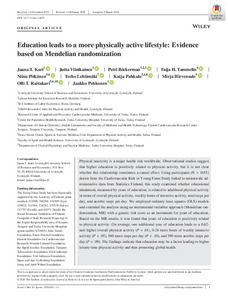Education leads to a more physically active lifestyle: Evidence based on Mendelian randomization
Kari JT; Viinikainen J; Böckerman P; Tammelin TH; Pitkänen N; Lehtimäki T; Pahkala K; Hirvensalo M; Raitakari OT; Pehkonen J
Education leads to a more physically active lifestyle: Evidence based on Mendelian randomization
Kari JT
Viinikainen J
Böckerman P
Tammelin TH
Pitkänen N
Lehtimäki T
Pahkala K
Hirvensalo M
Raitakari OT
Pehkonen J
WILEY
Julkaisun pysyvä osoite on:
https://urn.fi/URN:NBN:fi-fe2021042822771
https://urn.fi/URN:NBN:fi-fe2021042822771
Tiivistelmä
Physical inactivity is a major health risk worldwide. Observational studies suggest that higher education is positively related to physical activity, but it is not clear whether this relationship constitutes a causal effect. Using participants (N = 1651) drawn from the Cardiovascular Risk in Young Finns Study linked to nationwide administrative data from Statistics Finland, this study examined whether educational attainment, measured by years of education, is related to adulthood physical activity in terms of overall physical activity, weekly hours of intensive activity, total steps per day, and aerobic steps per day. We employed ordinary least squares (OLS) models and extended the analysis using an instrumental variables approach (Mendelian randomization, MR) with a genetic risk score as an instrument for years of education. Based on the MR results, it was found that years of education is positively related to physical activity. On average, one additional year of education leads to a 0.62-unit higher overall physical activity (P < .01), 0.26 more hours of weekly intensive activity (P < .05), 560 more steps per day (P < .10), and 390 more aerobic steps per day (P < .09). The findings indicate that education may be a factor leading to higher leisure-time physical activity and thus promoting global health.
Kokoelmat
- Rinnakkaistallenteet [29335]
